GROUND
ZERO,
New
York,
NY—July
18,
2004—At
what
age
do
we
stop
our
willingness
to
die
for
what’s
right
for
our
Children’s
Children’s
Children,
or,
for
that
matter,
anyone’s
children
and
their
Children’s
Children’s
Children?
The
New
York
Times
reported
today
a
series
of
stories
about
men
age
fifty
plus
who
died
fighting
the
war
in
Iraq.
The
question
posed
in
the
story
is
whether
these
“older”
men
should
be
in
combat.
Another
way
of
putting
it,
“Is
war
for
the
young?”
To
date,
of
the
900
American
deaths
in
Iraq,
ten
have
been
age
fifty
or
older
(a
total
of
one
percent
1%
of
all
deaths).
Seven
died
non-combat
deaths
ranging
from
heart
attacks
to
internal
complications.
Of
the
275,000
troops
deployed
or
en
route
to
the
combat
zones,
5,570
are
fifty
plus,
about
two
percent
(2%).
The
current
ten
age
fifty-plus
casualties
leave
behind
eleven
grandchildren
and
a
combined
twenty-one
decades
of
marriage.
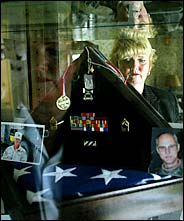 The
question
rattling
through
the
Times
story
provoked
the
question
of
what
anyone
is
willing
to
die
for
regardless
of
age.
Is
there
a
time
when
a
person
can
retire
his
or
her
beliefs
fundamental
to
the
liberty
and
freedoms
we
enjoy,
and
ignore
any
duty
or
responsibility
to
fight
for
them,
even
to
the
death?
The
question
rattling
through
the
Times
story
provoked
the
question
of
what
anyone
is
willing
to
die
for
regardless
of
age.
Is
there
a
time
when
a
person
can
retire
his
or
her
beliefs
fundamental
to
the
liberty
and
freedoms
we
enjoy,
and
ignore
any
duty
or
responsibility
to
fight
for
them,
even
to
the
death?
One
of
the
main
reasons
given
by
the
older
men
was
that
they
felt
a
duty
to
go
into
combat
because
they
had
trained
the
younger
men
under
their
command.
To
abandon
them
would
be
like
a
father
shoving
his
son
into
the
jaws
of
an
angry,
hungry
bear
so
he
could
escape
unscathed.
These
grandfathers
didn’t
feed
their
kids
to
the
bears.
Ten
of
them
got
eaten.
There
are
reasons
the
did
that
can’t
be
easily
seen
on
the
surface.
These
reasons
flow
deep
in
the
undercurrents
of
age’s
duty
and
responsibility
to
the
future.
WHAT
WOULD
THE
GRANDCHILDREN
THINK?
One
such
reasons
untold
by
the
Times
is
the
image
the
grandfathers
embossed
in
the
minds
of
their
grandchildren’s
grandchildren.
Children
reduce
the
complex
to
simplicity.
If
grandpa
went
to
war
to
help
people
be
free
so
that
kids
in
other
parts
of
the
world
could
enjoy
the
same
things
kids
in
America
enjoy—the
right
to
be
anyone
they
want
to
be—then
the
reason
for
grandpa’s
death
is
not
necessarily
a
tragedy,
but
rather
a
legacy.
Grandpa
becomes
a
Knight
In
Shining
Armor,
not
a
victim
of
ill-conceived,
ill-planned
and
executed
war
driven
by
political
and
economic
demons
intent
on
conquering
the
world.
Despite
all
the
pundits
today
shooting
holes
in
the
reasons
why
we
shouldn’t
be
in
Iraq,
history
will
one
day
paint
a
picture
of
our
involvement
there
as
an
attempt
to
stop
the
progress
of
tyranny
and
oppression
while
other
nations
we
once
helped
escape
the
claws
of
tyranny
and
oppression
turned
their
backs.
The
ten
grandfathers
who
died
in
Iraq
will
be
recorded
as
Grandfathers
of
Vigilance,
men
who
died
for
the
grandchildren
of
Iraq,
as
well
as
for
the
security
of
their
own
grandchildren.
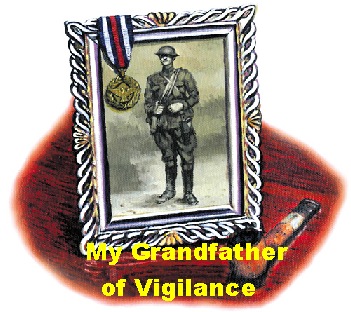 This
memory
that
will
last
in
the
minds
of
the
children
and
their
children’s
children’s
children
who
pass
the
Purple
Heart
and
American
flag
grandpa
got
in
Iraq
on
to
the
next
generation.
This
memory
that
will
last
in
the
minds
of
the
children
and
their
children’s
children’s
children
who
pass
the
Purple
Heart
and
American
flag
grandpa
got
in
Iraq
on
to
the
next
generation.
My
grandfather
fought
in
the
Spanish
American
War.
I’ve
always
been
proud
to
brag
on
his
service,
even
if
he
was
only
a
cook.
I
remember
him
telling
his
tale
tales
about
that
time
in
his
life,
and
looking
at
the
faded
pictures
in
his
scrapbook.
I
watched
him
proudly
put
on
his
VFW
hat
with
all
the
little
medals
on
it
for
all
the
service
he
had
done
and
puff
out
his
chest
as
though
he
were
ready
to
charge
San
Juan
Hill
again.
My
Grandpa
McPherron
was
a
Sentinel
of
Vigilance.
His
age
didn’t
matter.
What
mattered
was
that
he
had
been
willing
to
fight
and
die
in
some
foreign
land
for
the
freedom
of
others
he
didn’t
even
know.
In
the
purest
sense,
all
of
America’s
wars
have
been
fighting
for
the
anonymous.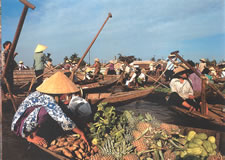
I
have
told
my
children
many
times
how
proud
I
am
of
fighting
in
Vietnam.
Despite
all
the
critics
of
that
war,
then
and
now,
I
know
that
thousands
of
Vietnamese
are
free
today
because
of
what
we
did.
These
Vietnamese
live
now
in
the
United
States,
the
second
generation
of
refugees.
In
1990
the
Vietnamese
population
was
just
over
a
half
million.
In
2000
that
doubled
to
1.2
million.
Many
Vietnamese
hold
high
political
offices
at
federal,
state
and
local
levels.
They
own
businesses,
are
wonderfully
educated,
and
form
a
conduit
back
to
their
country
feeding
it
the
democratic
principles
that
will
one
day
overpower
the
grip
communism
has
to
control
and
dictate
the
rights
of
many
by
the
few.
PLANTING
THE
SEEDS
OF
DEMOCRACY
THROUGH
DEATH
The
same
is
true
in
Iraq.
It
may
be
a
few
generations
from
now,
but
the
seeds
of
democracy
have
been
planted.
Ten
of
those
seeds
belong
to
American
warriors
age
fifty
plus,
men
who
died
in
the
service
of
their
country.
But,
because
of
their
age,
these
men
ultimately
died
serving
the
Children’s
Children’s
Children
of
Iraq—those
generations
who
will
be
the
benefactors
of
liberty
yet
to
unfold.
The
older
a
man
becomes,
the
more
responsibility
he
feels
to
the
future.
It’s
called
maturity.
The
question
about
the
“age
of
dying”
in
defense
of
liberty
and
freedom
seems
totally
unfair
to
even
ask,
for
it
supposes
that
we
are
all
given
some
“limited
responsibility”
time
frames
in
relation
to
protecting
our
fundamental
rights
or
the
rights
of
others.
At
what
point
does
a
grandfather
stop
telling
his
grandchildren
to
stand
up
for
what
is
right,
to
fight
for
what
is
right,
and
stop
promoting
that
the
duty
of
anyone
who
enjoys
freedom
and
liberty
is
to
help
others
fight
and
defend
theirs?
If
there
is
a
time
limit
on
our
ability
to
stand
up
to
tyranny
and
oppression
because
of
our
age,
then
when
does
that
time
and
date
arrives?
And
when
it
does,
should
we
all
be
“de-Constitutionalized?”
The
Constitution
of
the
United
States
applies
to
us
all
from
birth
to
death
if
we
are
native
born
Americans.
New
citizens
are
enjoined
by
it.
Part
of
the
duty
to
our
Constitution
is
to
fight
for
our
rights
and
the
rights
of
others
to
be
free.
If
that
duty
to
stand
up
for
freedom
here
and
afar
depreciates
with
age,
then
so
does
our
Constitutional
rights.
When
we
no
longer
can
fight
for
freedom—ours
or
anyone
else’s--we
have
none.
Fighting
for
freedom
around
the
world
has
been
the
core
of
American
foreign
policy
since
we
set
foot
in
Europe
in
World
War
I
and
offered
the
lives
of
our
young
and
old
to
defend
the
rights
of
others.
Iraq
is
no
different
than
any
other
war
America
has
fought
save
one
exception.
The
Iraq
war
is
in
retaliation
to
the
attack
on
America’s
security,
September
11,
2001.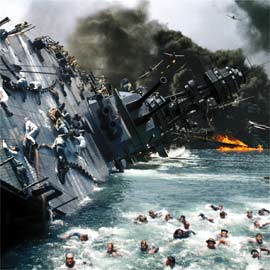
Unlike
any
other
conflict
(the
closest
parallel
may
be
the
attack
on
Pearl
Harbor)
no
group
of
individuals
had
dared
to
assault
American
soil
in
modern
times
until
September
11,
2001.
I
was
there
that
day.
I
saw
the
horror
of
2,748
people
killed
in
a
senseless
attack
on
the
innocent,
and,
had
the
attack
been
a
half
hour
or
more
later,
it
may
have
resulted
in
ten
times
those
deaths.
IRAQ:
A
WAR
ON
TERRORISM
WHERE
GRANDPAS’
DIE
AS
HEROES
Iraq
is
a
war
on
terrorism,
a
war
on
the
Beast
of
Terror
who
spilled
the
blood
of
thousands
of
Americans
on
U.S.
soil
and
then
sang
and
danced
in
glee
over
their
achievement.
The
grandfathers
in
Iraq
who
died,
gave
their
lives
protecting
their
grandchildren
from
the
terrorist
planning
to
kill
more
innocent
Americans.
By
fighting
terrorism
in
Iraq,
America
validates
its
resolve
to
stand
up
for
the
rights
of
its
most
vulnerable
citizens,
the
children.
When
grandfathers
are
willing
to
die
to
protect
their
grandchildren,
and
the
grandchildren
of
the
world,
it’s
not
a
travesty,
but
a
legacy
of
Vigilance
that
should
be
honored
and
applauded
rather
than
questioned.
It
was
said
once
that
a
man
does
not
know
his
own
character
until
he
is
faced
with
the
question
of
what
he
is
willing
to
die
for.
If
the
freedom
of
others
and
their
children
is
the
price
of
death,
then
it
is
worth
the
cost,
for
the
generations
that
follow
will
remember
that
the
ten
grandpas
who
died
in
Iraq
were
Sentinels
of
Vigilance,
and
that
each
died
a
hero
in
their
grandchildren’s
grandchildren’s
eyes.
June
16
Death's
Ashes
On
Strollers
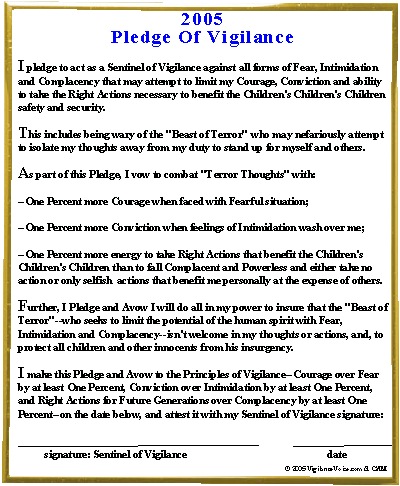

.jpg)
 The
question
rattling
through
the
Times
story
provoked
the
question
of
what
anyone
is
willing
to
die
for
regardless
of
age.
Is
there
a
time
when
a
person
can
retire
his
or
her
beliefs
fundamental
to
the
liberty
and
freedoms
we
enjoy,
and
ignore
any
duty
or
responsibility
to
fight
for
them,
even
to
the
death?
The
question
rattling
through
the
Times
story
provoked
the
question
of
what
anyone
is
willing
to
die
for
regardless
of
age.
Is
there
a
time
when
a
person
can
retire
his
or
her
beliefs
fundamental
to
the
liberty
and
freedoms
we
enjoy,
and
ignore
any
duty
or
responsibility
to
fight
for
them,
even
to
the
death? This
memory
that
will
last
in
the
minds
of
the
children
and
their
children’s
children’s
children
who
pass
the
Purple
Heart
and
American
flag
grandpa
got
in
Iraq
on
to
the
next
generation.
This
memory
that
will
last
in
the
minds
of
the
children
and
their
children’s
children’s
children
who
pass
the
Purple
Heart
and
American
flag
grandpa
got
in
Iraq
on
to
the
next
generation.

